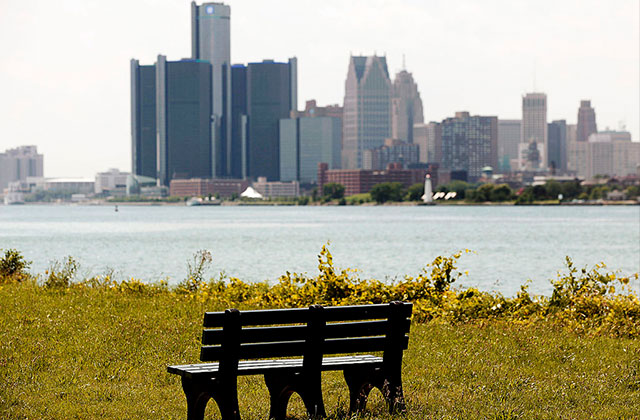Amid the frequent reports of how Detroit is experiencing a revitalization, there is less attention given to how the city is grappling with being under-populated, making it difficult to deliver municipal services to sparsely inhabited areas. One city official has put forth what he sees as a solution: turn off water in certain neighborhoods to force residents to relocate.
Detroit has a population of about 670,000 people, down from 2 million in the 1950s. The majority-Black city is 139-square miles, of which 24 square-miles are vacant land. Now, the cash-strapped city must contend with how—or if—to provide services to the entire municipality.
“Areas that are so sparsely populated, perhaps the neighborhood should be shut down and just move people out? We think so,” Gary Brown, director of the Detroit Water and Sewerage Department, told Bridge Michigan, a Detroit journalism cooperative.
Brown said this in response to a report that Detroit has commissioned a five-year study to help prioritize repairs to the water system—a study that officials have acknowledged may help determine whether the city will offer to pay to move residents out of some neighborhoods and shut water lines.
Mayor Mike Duggan’s chief of staff issued a statement saying that he does not agree with the relocation plan, although Brown said Duggan was “interested” in it.
Detroit’s water infrastructure is old. Most pipes were built before World War II. The city can only budget to replace about 2 percent a year and must manage which areas are in most dire need. The study weighs several factors when deciding how to prioritize, including age and health of the lines, and the likelihood of a neighborhood being revitalized. "Perhaps unsurprisingly, two of the city’s hottest areas—downtown and Midtown—are deemed higher priorities for line replacement,” reports Bridge.
Brown argues that fixing pipes and other infrastructure in neighborhoods that do not have a lot of residents is not cost-effective. He says by shutting the neighborhood down completely, the city can concentrate on areas that have more residents.
This argument does not sit well with affordable housing advocates. Detroit has had other relocation efforts that have largely failed to do anything but disrupt and destroy Black communities. Per Bridge:
rnt
Told of the water study by Bridge on Tuesday, one neighborhood activist sighed and said, “Jesus.”
t
“It’s appalling,” said the activist, Russ Bellant, president of the HelCo Block Club on the city’s northeast side, a retired Water Department plant operator and city council candidate last year.
t
“It’s not for Gary Brown to decide where people live. Water is a service vital to people’s health. It’s not to be used as a political tool to re-engineer the city.”
News of the study is being released at the same time it emerged that one of seven Detroit water customers whose service was shut off for nonpayment this year still do not have water—900 of those have been without for three months. Policy states water should be turned back on no more than 48 hours after a payment plan is made. In 2014, it was revealed that Detroit was pursuing an aggressive shutoff policy to increase collections.
